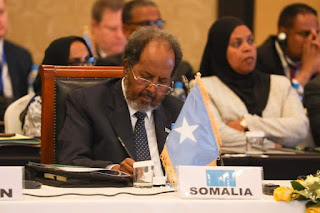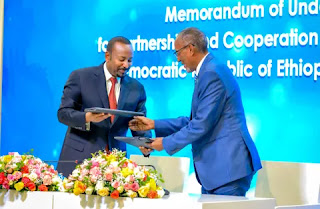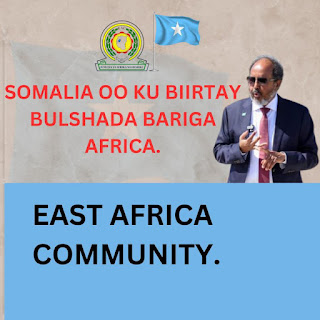COMMUNITY-POLICE PARTNERSHIP AS A LASTING SOLUTION FOR FIGHT AGAINST ALSHABAAB IN MOGADISHU
Introduction
Al-shabaab have continued to pose a significant threat to
national security across Somalia and its neighbours Kenya and Ethiopia.
Al-Shabaab, a terrorist organisation, has continued its violent insurgency in
southern and central Somalia despite being defeated by Somali and Ethiopian
forces in 2007. “The group has exerted temporary and, at times,
sustained control over strategic locations in those areas by recruiting,
sometimes forcibly, regional sub-clans and their militias, using guerrilla
warfare and terrorist tactics against the Federal Government of Somalia (FGS),
African Union Transition Mission in Somalia (ATMIS) peacekeepers, and
nongovernmental aid
organizations”.
Al-Shabaab’s lethal rebellion continues without the hope of
ending any time soon. The group constantly remains a step ahead of domestic and
regional operations of military. The militants' agility, coupled with
disintegration and split among their foes, has allowed them to integrate into
Somali culture. There is increasing domestic and international agreement that
Al-Shabaab cannot be defeated just through military tactics. However, neither
Somali elites nor the country's foreign partners are interested in considering
alternatives, particularly talks with terrorist leaders. Nevertheless, the three
front fighting strategy (ideology, economic and military) of President Hassan
Sheikh Mohamud seems to be working.
The continued existence of Al-shabaab in most regions of
Somalia makes fight against the group a working progress. The government of Somalia,
regional and global organizations have continued to come up with strategies to
neutralize the group. Among the strategies is the use of ATMIS officers who
conducted various covert operations to drive out Al-Shabaab militants in
various regions in Somalia. However, one of the neglected but effective
strategies that have succeeded in most countries is community participation.
Involving community members in fight against Al-Shabaab should be supported in
Somalia. Currently, the successful joint operation conducted by the FG security
forces and the community defence forces (Ma'awisley) in Hirshabelle and
Galmudug against Al-Shabaab shows the importance of the
community participation in the fight
against the terrorists.
Civilian-Police Partnership in Fight Against
Al-Shabaab
Since the community members have lived in Somalia for long
enough, they have adequate information about Al-shabaab and their tactics.
Hence, community could be involved in fight against Al-shabaab in the following
ways.
1. Civilian-Police Groups
Civilian-police groups have been established and continues
existing in unstable countries in Africa in which governments are not able to
defend citizens against security threats posed by terror groups. In Somalia,
civilian-police groups have been fighting against Al-shabaab to keep their
affiliated communities safe and secure. Recently, civilian-police groups in
Somalia received a significant boost from the current administration of
President Hassan Sheikh Mohamud’s who is supporting a new policy supported the
use of civilian-police groups to help weed out Al-Shabaab militia from
villages.
2. Police-Community
Partnerships
The partnership between police and community members would
play a critical role in fight against Al-shabaab. The partnership ensures
engagement of local law enforcement and leaders of community in a dialogue to
recognize issues and collaboratively come up with solutions for improving
partnerships between police and community members. Community members share
intelligence and information about Al-shabaab militia with police officers who
take action through arrests and imprisonment of the suspects.
What Needs to be done to Support Civilian-Police
Partnership
1. Promoting Civilian
Uprising Against Al-shabaab
The government need to create awareness on the need for
community members to move out of their comfort zone and constantly take part in
fighting against Al-shabaab. This is because the civilians are the ones who are
greatly affected when Al-shabaab carries out any terror attack. Civilian
uprising can be promoted by equipping them with weapons and also communication
gadgets to facilitate their communication with authorities.
2. Developing a Legal Framework to Support
Civilian Uprising
There is need for introduction of laws through Act of
Parliament to ensure that civilian uprising groups are recognized by the law in
Somalia. The legal framework should cover provisions on how to provide and
license weapons for the civilian groups.
Introduced laws should establish provide mechanisms for
registering the groups so that there are terror groups arise in disguise of
civilian uprising groups.
3. Security Training for
the Members of Civilian Groups
Though civilian groups are helping in fight against
Al-shabaab, they lack skills and competencies that a security personnel should
have. This puts them at higher risk of being captured or even killed by
Al-shabaab militia. Hence, there is need for government of Somalia to come up
with strategies and also initiate programs intended to train the civilian
groups. The training should aim to equip the civilian groups with skills on how
to use weapons, how to gather intelligence and even conduct highly militarised
operations.
4. Introduce a Communal
Security Initiative
Community should be at forefront in fight against
Al-shabaab who continues to pose a threat to their safety. Borrowing from
Kenya’s Nyumba Kumi initiative, there is need for civilians to group themselves
into clusters and make a commitment to protect each other. Nyumba Kumi was
presented as a remedy to criminal conduct and terrorism. This effort encourages
residents to continually communicate and share information concerning one
another, and they are supposed to monitor security dangers and submit
information to local government and enforcement organs. The Initiative should
aim to bring together the police, civil society, and local communities to
develop local solutions to safety and security concerns. This initiative should
be designed for citizens to know their neighbours. It should be based on the
assumption that citizens are well-versed in their surroundings and can detect
and report any suspicious or odd activity. This would go a long way in fighting
against Al-shabaab.
5. Achieve a Comprehensive
Political Settlement
Failure to have a comprehensive political settlement have
made (it) impossible to fight against Al-shabaab. Continued lack of trust
between the civilians and the government have continued to make Al-shabaab
stronger as civilians who feel the government is not accountable end up joining
the group. Only a solid political agreement that ensures a precise distribution
of authority, duties, and resources would be able to end Somalia's culture of
mistrust and lack of responsibility. The top priority for the new government of
Somalia should be reaching a permanent political settlement. A settlement
serves as the foundation for agreement on matters concerning the constitutional
reform process and the rule of law. It could also create the framework for
future constitutional and state-building efforts, allowing the security
establishment to work more efficiently. Another critical concern is
strengthening the Somali security sector to guarantee a peaceful transition
from the ATMIS peacekeeping mission and supporting economic growth to boost the
legitimacy of the new government. Moreover, harnessing the Somali people's
exceptional entrepreneurial abilities and providing perfect circumstances for
additional investment will significantly contribute to the social and economic stability.
6. Change the Administrative Structure of
Mogadishu
Mogadishu is majorly inhabited by Hawiye Clan, followed by
the Banadiri and other clans. To ensure effective fight against the Al-shabaab,
there is need for Mogadishu its own administration elected by the people and
not appointed by the Federal Government. The Hawiye clan and other residents in
Mogadishu should elect their own Mayor or President of the State who would be
accountable for the security of the region. The mayor /State President should
also appoint a police commissioner who would take orders from the president of
State or the Mayor.
7. Resettle the Internally Displaced People
(IDPs) in Mogadishu
There are numerous internally displaced people (IDPs)
living bushes and camps in Mogadishu. In most cases, these IDPs are linked to
terror attacks as they happen to host terrorists. This could be attributed to
the fact that they are not effectively monitored by security agents. It is
therefore important for the government to resettle the internally displaced
people (IDPs) and engage them in productive economic activities. There is also
a need for the residual areas to be monitored and surveillance by the security
agents to ensure that there are no IDPs who are involved in terrorism.
Conclusion
Terrorism is a problem that government cannot fight all
alone. It needs involvement of every stakeholder available including police,
civilians, and regional military personnel. The fight against Al-shabaab cannot
be won by the FG offices but at the community
level. This is because Al-shabaab members are living among the civilians and
the only way to identify them is through the civilians. Moreover, the civilians
being the most affected group when Al-Shabaab stages a terror attack, they
should be heavily involved. Their involvement can be through civilian-police
partnerships and also through empowered community police working hand in hand
with the security forces. However, their involvement needs to be legalized and
recognized by the law and hence the need to have laws or acts of parliament.
There is also need for civilian to be empowered by giving them weapons and
registering civilian uprising groups. In my opinion, the
only lasting solution to fight against Al-shabaab and any other terrorist group
is civilian-police partnership. Moreover, the government should win the
ideological and economic battle as well as the military one.
By
Abdullahi Mohodin Hassan ( Abdullahi Yabarow)
LLM
Siigaale1@




Comments
Post a Comment